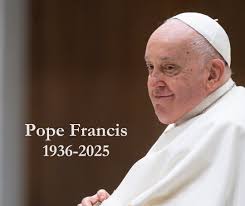Pope Francis, born Jorge Mario Bergoglio on December 17, 1936, in Buenos Aires, Argentina, was a transformative figure in modern Catholicism. As the first Jesuit, the first from the Americas, and the first from the Southern Hemisphere to ascend to the papacy, his tenure from 2013 until his death in 2025 redefined the spiritual and social direction of the Catholic Church.
Early Life and Vocation
Bergoglio was the eldest of five children in a devout Catholic family of Italian heritage. After surviving a severe illness in his early twenties that led to the removal of part of a lung, he experienced a spiritual awakening. In 1958, he joined the Jesuit order and was ordained a priest in 1969. He rose through ecclesiastical ranks, serving as Jesuit provincial superior in Argentina (1973–1979), archbishop of Buenos Aires (1998), and was made cardinal by Pope John Paul II in 2001.
Rise to the Papacy
Following the resignation of Pope Benedict XVI in 2013, Bergoglio was elected pope on March 13, taking the name Francis in honor of Saint Francis of Assisi. This choice symbolized his commitment to humility, care for the poor, and a mission of peace. From the outset, Pope Francis exhibited a simple, pastoral style. He chose not to live in the opulent papal apartments, instead residing in the Domus Sanctae Marthae, and consistently shunned excess and formality.
Key Themes and Reforms
1. Pastoral Outreach and Humility:
Francis was lauded for his emphasis on mercy and closeness to the people. He washed the feet of prisoners, visited the sick, and called for priests to embody the “smell of the sheep” — to live among and serve their communities rather than command from above.
2. Inclusivity and Social Justice:
Though upholding traditional Church teachings, he softened the Church’s tone toward LGBTQ+ individuals, emphasizing pastoral care over judgment. He criticized the Church’s past treatment of women and promoted their inclusion in key Vatican roles, even while upholding the male-only priesthood.
3. Economic and Environmental Advocacy:
A vocal critic of “trickle-down economics,” consumerism, and global inequality, Pope Francis championed environmental stewardship. His encyclical Laudato Si’ (2015) urged global action against climate change and called environmental care a moral imperative.
4. Global Diplomacy and Human Rights:
Francis played a crucial role in restoring diplomatic ties between the U.S. and Cuba and sought to improve the Church’s relationship with China. He was a fierce defender of migrants and refugees, opposing anti-immigration policies worldwide. In 2022, he issued a historic apology for the Church’s role in the abuses against Indigenous peoples in Canada.
5. Church Reform and Synodality:
Francis sought to decentralize authority in the Church, promoting a synodal model of governance that emphasized listening and inclusion. The Synod on Synodality, initiated in his final years, was seen as one of the most significant Church events since the Second Vatican Council, shaping future Church structures and engagement.
6. Response to Crises:
During the COVID-19 pandemic, Francis adapted Church practices, suspended gatherings to prevent contagion, and emphasized solidarity, care for the poor, and vaccination as moral duties. He also responded firmly to scandals of financial corruption and sexual abuse, though his handling of some cases drew both praise and criticism.
Legacy and Final Years
Pope Francis’s impact extended far beyond the Catholic world. His papacy was a clarion call for a more compassionate, inclusive, and mission-driven Church. He consistently prioritized mercy over judgment, dialogue over division, and action over rhetoric.
Francis died on April 21, 2025, at the age of 88, following a stroke and subsequent heart failure. His final public appearance was on Easter Sunday, a fitting moment for a pontiff who consistently emphasized hope, renewal, and the resurrection of humanity’s shared dignity.
Conclusion
Pope Francis will be remembered as a spiritual reformer, a global moral voice, and a shepherd of the marginalized. His legacy lies not only in doctrinal teachings but in the spirit of his leadership — one rooted in humility, justice, and an unrelenting call to love.
Nzubechukwu Eze.









